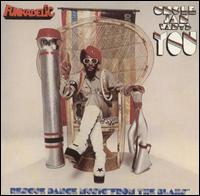Uncle Jam Wants You
| Uncle Jam Wants You | ||||
|---|---|---|---|---|
 | ||||
| Studio album by | ||||
| Released | September 21, 1979 | |||
| Studio | United Sound Systems, Detroit, Michigan | |||
| Genre | ||||
| Length | 41:43 | |||
| Label | Warner Bros. | |||
| Producer | George Clinton | |||
| Funkadelic chronology | ||||
| ||||
| Review scores | |
|---|---|
| Source | Rating |
| AllMusic | |
| Blender | |
| Christgau's Record Guide | B+[3] |
| Rolling Stone | favorable (1979)[4] |
Uncle Jam Wants You is the eleventh studio album by American funk rock band Funkadelic. It was originally released by Warner Bros. Records on September 21, 1979, and was later reissued on CD by Charly Groove Records and Priority Records. It was produced by George Clinton under the alias Dr. Funkenstein. It is the first Funkadelic album since America Eats Its Young in 1972 not to sport a cover illustrated by Funkadelic artist Pedro Bell, though Bell did provide artwork for the album’s back cover and interior. Uncle Jam Wants You was the second Funkadelic album to be certified gold. The album peaked at #18 on the US Billboard 200 and #2 on the US Billboard Top R&B/Hip-Hop Albums charts.
Significance
In some ways, Uncle Jam Wants You (a reference to the "Uncle Sam wants you!" US Army recruitment posters) is a more militant sequel to the group's previous album, One Nation Under a Groove. Whereas that album described an ideal country ruled by Funk, "Uncle Jam" attempts to provoke the conversion into Funkadelia. Its purpose is also (as the cover claims) to "rescue dance music from the blahs."
The cover art depicts George Clinton in a Huey Newton-Black Panthers pose, reflecting the more martial lyrical themes of the album. The album features the band's last big hit single, "(Not Just) Knee Deep", an edited version of which went to number one on the Billboard Soul singles charts. This album had a profound influence on the West Coast hip-hop scene, especially the legendary DJ organization known as Uncle Jamm's Army.
Samples of the 15-minute cut "(Not Just) Knee Deep" can be heard in De La Soul's "Me Myself and I" (1989), the Teddy Riley-produced "Get Away," and several of Dr. Dre's productions.
This section possibly contains original research. (May 2012) |
Reception
- Allmusic.com "Uncle Jam Wants You takes not merely a more daring musical approach but a more forthright political stance".
- Rolling Stone (10/3/02, p. 106) - 4 stars out of 5 - "The home of 'Freak Of The Week' (which launched a thousand g-funk songs)."
Track listing
Side One
- "Freak of the Week" (George Clinton, Jr., Pete Bishop, DeWayne McKnight) - 5:34
- "(Not Just) Knee Deep" (G. Clinton, Jr.) - 15:23 (released as two-part single WBS 49040)
Side Two
- "Uncle Jam" (G. Clinton, Jr., Garry Shider, Bernie Worrell, Bootsy Collins) - 10:26 (released as two-part single WB 49117)
- "Field Maneuvers" (Darryll Clinton, Donna Lynn Clinton) - 2:25
- "Holly Wants to Go to California" (G. Clinton, Jr., Worrell) - 4:24
- "Foot Soldiers (Star-Spangled Funky)" (G. Clinton., Jr., Jim Vitti) - 3:31
Personnel
- Funkadelic Rescue Dance Band (as given in the liner notes)
- Axe Force:
- Fret Commanders Michael "Kidd Funkadelic" Hampton, Gary "DooWop" Shider, Eddie "Maggot Brain" Hazel
- Keyboard Battlecruisers:
- Uncle Jam's Drums and Percussion:
- Tyrone "Speedfeet" Lampkin, Larry Fratangelo
- Bass Anti-Flam Units:
- Rodney "Skeet" Curtis, Cordell "Boogie" Mosson
- Uncle Jam's Drumset, and funky beatz:
- Dennis Chambers
- Vocal Assault & Funkatition Team:
- Uncle Jam Clinton, Gary "DooWop" Shider, Larry "Sir Nose" Heckstall, Sheila Horn, Ron "Prophet" Ford, Jeanette McGruder, Dawn Silva, Michael "Clip" Payne, Greg Thomas, Ray "Stingray" Davis
Mallia Franklin is credited as a background vocalist, but she was the female lead singer on the song "Freak of the Week".
- Additional Musicians
- Guitars:
- Bass:
- Billy Bass Nelson, William Collins, Jeff Bunn
- Keyboards:
- Junie Morrison, Gary Hudgins, Gerome Rogers
- Drums:
- Tiki Fulwood, William Collins, Dennis Chambers, Jerome Brailey
- Background Vocals:
- Linda Brown, Jessica Cleaves, Mallia Franklin, Philippe Wynne, Lige Curry, James Wesley, Greg Boyer, Gerome Rogers
According to Jerome Brailey, Tiki Fulwood is credited on the recording but didn't actually perform.
- Photography
- Diem Jones
References
- ^ a b "Uncle Jam Wants You - Funkadelic | Songs, Reviews, Credits | AllMusic". AllMusic.
- ^ "Uncle Jam Wants You - Blender". Archived from the original on 2009-09-15. Retrieved 2009-07-20.
- ^ Christgau, Robert (1981). "Consumer Guide '70s: F". Christgau's Record Guide: Rock Albums of the Seventies. Ticknor & Fields. ISBN 089919026X. Retrieved February 24, 2019 – via robertchristgau.com.
- ^ Rollingstone
- ^ Brackett, Nathan; Hoard, Christian David (2004). The New Rolling Stone Album Guide. Simon and Schuster. p. 316. ISBN 9780743201698.
